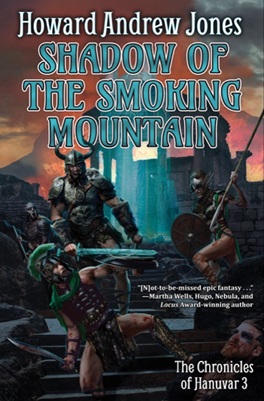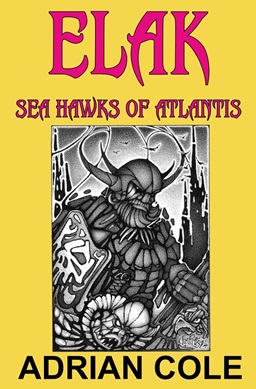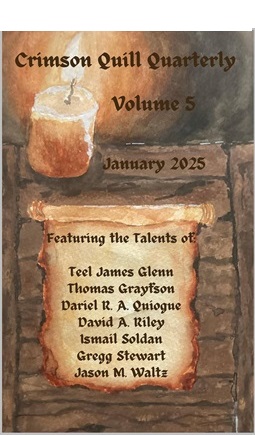LAMENT FOR THE FATHERS
LAMENT FOR THE FATHERS, by Joshua Hampton:
Heed me, Sons of the Fathers,
huddled round the great hall’s hearth,
let’s hear such tales of war and woe,
of kin and kind unlike us,
once told on false fiddles and lying lyres
strung with catgut slanders,
screaming sweet songs of dreadful deeds
never to be undone by time.
For there in the vastness of the Axton Vale
the Fathers stood,
sons of miners,
Men of moil and muscle,
dregs and dirt,
cast off like dead-iron dross
from the blacksmith’s block,
their crude mail marred
and made grey with ash and smoke,
the sharp edges of their sheathless swords
set on their spauldered shoulders
‘neath pothelms plumed of partridge feathers.
No bright banners bid them rally ‘round,
nor King nor Crown did call their charge,
only kindred and courage
made straight the meager marching lines,
and guided their bitter blades to battle.
Yet across the farmers’ flowing fields,
where grass grew green and tall as greaves,
the Armies of Andulen waited and watched,
fresh from feasts of frumenty and fired fowl,
six thousand soldiers,
sworn to the Seven Crowns,
a beautiful band in polished pauldrons
and new-made mail,
the Sun smiling in its silvery sheen,
twice the Fathers’ host,
war-proud and ready,
led by Fieldlords witting as wise.
But where their foes fought for family,
for freeholds and freedom,
the Seven Armies had
only their orders to urge them onward,
no purpose past their Kings’ own words
wicked with gutless greed,
and for that they were
heartless and hindered,
outmatched though not outnumbered.
So at the ram horn’s hollow howl
the Fathers flew forth,
a flurry of arrows to follow,
their erne-eyed archers able as eager,
with full quivers loosed to lead the way.
A sleet-shower of broadheaded shafts
left the Seven’s shield-wall pierced like parchment,
the Kingsmen’s ends a lay
with lyric lettered in blood dark as oak apple ink
flowing from the holes in their heaters.
And when at last they met in medley,
the Fathers with their blunted blades,
the Seven’s swords struck fresh from the fire,
the cadence of clanging claymores,
so like nimble notes from strings of skalds,
was a ballad bleak with blight and ruin,
yet not for the Fathers,
but the Men who’d come
to claim their crops and costly riches,
to make thralls of their Women and wives,
and burn the rest in whimsy.
Yes, these soldiers set in perfect plate
bought with gold-coin-wages
collected from the coffers of kings,
were soft as house-hounds,
their teeth tamed by high-table scraps,
and they were reaped like Autumn wheat,
cut down and cast like cobblestone
beneath the Fathers’ bloody boots.
And with each fighter felled,
the shimmer of the Seven’s shields
and plate were paled by plunder,
leaving the Sun, as vain as She was winsome,
to make her mirror elsewhere,
across the mountains in the flat faces of the Five Rivers.
All the while a weeping darkness drew closer,
a dreariness the Fathers drank in like mead,
filling them with a fire for the finishing blow
that would banish their rivals beyond regret.
But just as the Seven were set for surrender,
a war waged on their weary faces,
their ranks but wretched remnants
of that which once they were,
there came from the North a horseman
atop the hills that hemmed the graveyard-glen.
Syr Hildebrand they called him,
Kingsman and Captain at the Crowns’ command,
come to show the Fathers what fate they’d find in defeat.
He was clad in splendid panoply,
seven pieces told in tales,
all enchanted and each a plague
to those engaged against it.
In his hand a bastard sword, its blade a blaze of blue,
aflame with wild wyrm fire.
On his head the helm of Cuthred
King of Fraynes and freemen alike,
a bringer of breath at life’s end,
encircled by the Crown of Asta,
a coronet set with the shards of seven stars
that lit the wearer’s way in war.
His fingers folded into fine-forged gauntlets
to match his stately suit of mail,
which both were wiled by the Witch of the Wood,
to guide the hand and guard the heart.
His arm slung with the Conjurer’s Targe,
a treasure that kept its keeper safe
from swords as soon as sorcerer’s spells.
And last, a ring wrapped round his fourth finger,
a plain band imbued with impossible might
made a marriage gift to the Maiden of Greenleaf
many years gone.
Together this evilest array
made one Man an army,
an unruly wave to wash over any in his way,
unmatched by all at odds against him.
And so Syr Hildebrand,
Wielder, warrior and wretch,
raced down the ridge
to join his hobbled host of horsemen,
a diamond a’glitter amongst hand-got coals,
and in his valiance took the van
to meet the Fathers where they fought.
His burning brand swept through the swarm
of any foolish enough to face him.
Their blades broke on his breastplate,
shattered on his shield,
their axes splintered, spears snapped,
while with every swing of his searing sword
he felled more Fathers than a few,
five hundred at the front and then the rest,
three thousand all,
for if it was to fall or flee
they’d proudly pick the first,
to join the trodden heaps that
lay now beneath the strides
of the Seven’s galloping steeds,
leaving the crows to caw their course goodbyes
to the swineherds come to battle,
entwined now in death like a den of adders,
who at life’s last gasps
heard Syr Hildebrand sing to his soldiers
such songs of grit and gallantry,
lays with lies woven through every vicious verse.
And we who waved our Fathers farewell
when we were babes beneath our mothers’ breasts,
were left to welter in the warmth of their funeral fires,
to grow grey without their counsel,
and worse, their learned love.
And so here now we sit,
our backs bent by the years that followed,
our relic swords red with the rust,
and hearts heavy with the want for wrath
that will one day be reaped by our hungry hands.
And as the hearth-flame wanes
to leave us cold and cast alone again in our dark halls,
we, the Sons of the Fathers, will let our fury warm us
and like a lantern light our way,
until the Seven are served their rightful ends,
their harps and horns smashed ‘neath our horses’ hooves,
with Hildebrand’s head and hands hacked off
to make flourish for the Fathers’ thrones,
taken in tribute to all whose love we lost,
and as tokens of our triumphant deeds
never to be undone by time.
___________________________________________________________
By day JOSHUA HAMPTON is a mild-mannered associate creative director for an advertising agency. By night he’s a fantasy writer who finds his muse in everything from Anglo-Saxon epic poetry to Appalachian folklore. His fantasy work has been featured in Heroic Fantasy Quarterly, Aphelion and Mirror Dance, among others. His first fantasy novel, The Cikts, is available in trade paperback at Amazon.com. Joshua lives with his wife, two children, iguana and the occasional fish in Lanesville, Indiana.
To learn more about Josh, please visit his website: www.joshuahampton.com






